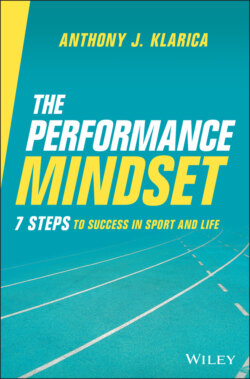Читать книгу The Performance Mindset - Anthony J. Klarica - Страница 26
Patience and persistence
ОглавлениеAerial skiing is a complex sport. It is also one of the more challenging sports for Australians to excel in, given how much the climate limits opportunities for time‐on‐task in the snow (although water jumps play a big part in specific aerial training). Our geography likely contributes more to our international performance in swimming than in skiing, compared with, say, Switzerland, where the conditions are reversed. It's not about talent, but opportunity. In addition, minimal attention and few role models in the sport limits potential extrinsic motivation to become involved or excel in winter sports compared with other sports. So for Jacqui Cooper to become one of Australia's greatest Olympians and the first Australian woman to make five Olympic Games was a feat par excellence.
When I spoke to Jacqui about her journey she told me, ‘If you had to rate my talent it would have been zero out of 100. And that wasn't just my opinion — the coaches and administrators agreed!’ Such was her reputation that, in 1999, after being freshly crowned world champion and world number one, she was asked by a coach to speak to a group of young female athletes and give them some inspiration. Upon introduction, one of the girls in the group politely enquired if she could ask a question. ‘Sure,’ Jacqui replied, thinking it would be about one of her achievements. Rather, the query was ‘Are you the acrobatic moron?’ The junior was Lydia Lassila, who became a training partner and teammate and progressed to win gold ahead of Jacqui 11 years later at the 2010 Winter Olympics. ‘We still laugh about it today,’ Jacqui said.
‘You can have talented people, but in my sport, if they don't have a capacity to take some risk, they won't achieve,’ she explained. ‘I was a risk taker. I also loved acrobatics. And I did work hard.’ Growing up, she recalls, she had no training as a gymnast and didn't focus on any specific sport. She tried different things but wasn't necessarily good at anything. ‘Mum and Dad were busy, with me being a triplet, so weekend sport didn't happen much. We didn't even have a trampoline. What I did have was lots of energy — Dad used to call me an energy ball — and whenever I could I would go to a friend's house or the trampoline centre to play,’ she said.
Then, in 1989, Jacqui met Geoff Lipshut, the current CEO of the Australian Winter Institute and the chef de mission for the 2022 Winter Olympics in Beijing. ‘He's a blend of Mr Myagi from The Karate Kid and Yoda from Star Wars,’ Jacqui recalled. ‘He literally saw me jumping on a trampoline that was next to the road when he was driving past. He was in the area to visit another athlete. The next day he met my parents, and that started my journey in aerial skiing. I was 16 years old. He put forward a 10‐year plan, and 10 years later he was there when the plan was achieved.’
Lipshut also nurtured the development and careers of Kristie Marshall, Alisa Camplin and Lydia Lassila, who all competed for Australia. Lassila was in a transition program for people leaving gymnastics who might be interested in aerial skiing. He happened to be at the Royal Melbourne Show one day and saw Alisa Camplin playing on a trampoline. Again he asked her parents if she might be interested in aerial skiing. Camplin went on to win an Olympic gold ahead of Jacqui at the 2006 Winter Olympics. If not for those lucky encounters, I wonder if Jacqui or Alisa would have gone on to become the athletes they did.
‘I was able to do only about 40 hours per year at the snow, so the first two years were slow growth with skiing. I got encouragement from others to keep going. I didn't back myself at all. What I did have was a place to direct my energy. It took me five years before I could land a jump.’ After she left school, Jacqui went to Colorado to pursue her development. ‘At the start I couldn't keep up with any of the athletes, so I skied with holiday makers and was even getting tips from them.’
Each of these aerial skiers followed a unique path that wasn't based solely on physical talent. They started out with a degree of talent and different experiences, but mindset enabled their persistence. Jacqui broke no junior records and was not a high achiever in any sport. She played multiple sports as a junior, but drew on an intrinsic passion, patience and energy, as well as the support and encouragement of others.
